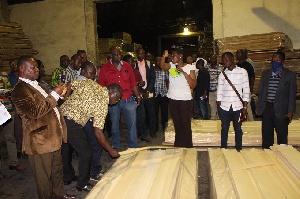Timber industry players from Liberia and Cote D’Ivoire, have visited Ghana for a three-day familiarization tour and workshop on timber legality, forest conservation and networking.
Hosted by the Nature and Development Foundation (NDF) of Ghana, the industry players were taken on a tour of some timber processing companies in the country to assess the level of compliance and measures put in place to ensure sustainability of the forests, as well as find means of accessing business opportunities in the country.
The seeming non-availability of legal, well-treated or well-dried lumber on the domestic market has caused many wood users to resort to the use of inferior and mostly illegal wood for projects in Ghana. This problem, coupled with the growing demand for wood, as a result of Ghana’s rapidly urbanising societies, calls for options to address this concern.
The Nature and Development Foundation (NDF) intends to help address this challenge by linking buyers to sources where they can procure legal and quality timber, thus the legal timber business-link tour to timber companies that are known to produce legal and quality timber for potential buyers.
According to Mr. Glen Asomaning, Director of Operations of NDF, the approach is to open opportunities through networking and building business relationships between suppliers and potential buyers. “The overall goal of the tour is to facilitate and lessen the burden of purchasing legal timber in the domestic market especially by private allied entities,” he said.
The group of about forty visited the Mondial Veneer Company Ltd, John Bitar and Company Ltd in the Western Region, Woodlow and Payap Ltd and Sir Charles Wood Processing Ltd at New Edubiasi in the Ashanti region.
In Kumasi, the group was at the Logs and Lumber Ltd. (LLL), where they went round the plant to see the processes through which timber from the forests is processed into veneer and other wood products for export and the local market.
During the tour a common concern raised by the bigger industries on their inability to supply the local market was the imposition of taxes on sales to local buyers.
Due to the special provisions under the Free Zones Act, companies are obliged to impose additional levies amounting to about 44% on the price of the products they sell to local buyers. This has resulted in them focusing on the export to the neglect of the local market, in spite of an administrative directive requiring them to supply about 30% of their products to the domestic market.
The industries and local market players are appealing to the government to consider reviewing the taxes to ensure they benefit from the bigger companies.
The group was made up of representatives from the Association of Ghana Industries (AGI), Association of Building and Civil Engineers of Ghana (ABCEG), Chartered Institute of Building (CIOB), from Ghana and Civil Society Organizations, Traders and government sector representatives from Liberia and la Cote D’Ivoire.
This activity is implemented as part of NDF’s project titled “Innovation for improved forest governance in West Africa; Demand and Supply side solutions in a changing landscape”. The project is receiving financial support from the EU, SIDA Sweden and UK DFID through the Food and Agriculture Organization (FAO) of the United Nations.
Business News of Sunday, 22 October 2017
Source: Mawuli Viwotor













